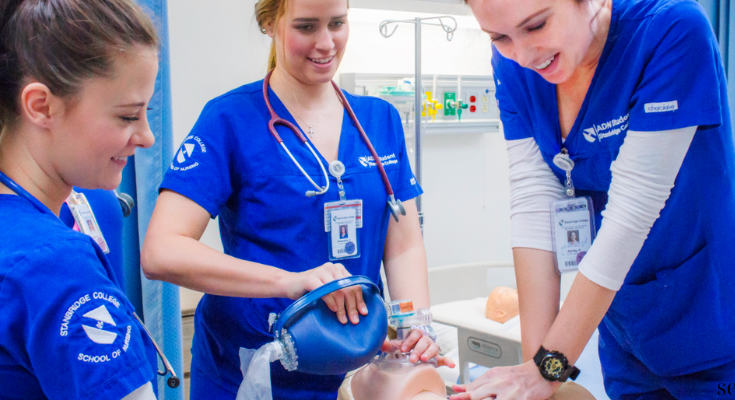In the realm of healthcare, Licensed Vocational Nurses (LVNs), also known as Licensed Practical Nurses (LPNs) in some states, play a crucial role in providing direct patient care under the supervision of registered nurses (RNs) and physicians. Becoming an LVN requires a dedicated educational journey that equips individuals with the necessary skills and knowledge to deliver competent nursing care in a variety of healthcare settings. In this comprehensive guide, we will delve into the educational requirements, training programs, licensure process, and career prospects for aspiring LVNs.
Understanding the Role of Licensed Vocational Nurses

Before delving into the educational requirements, it’s essential to grasp the responsibilities of an LVN. Licensed Vocational Nurses work closely with patients, providing basic nursing care such as monitoring vital signs, administering medications, dressing wounds, and assisting with personal hygiene. They also collaborate with other healthcare professionals to develop and implement patient care plans, maintain medical records, and educate patients and their families about various health conditions and treatments.
Educational Requirements for Becoming an LVN
To embark on a career as an LVN, individuals must complete a state-approved educational program, which typically includes a combination of classroom instruction and clinical training. The specific requirements may vary slightly from state to state, but the following outline provides a general overview of the typical educational pathway:
- High School Diploma or Equivalent: Most LVN programs require applicants to have a high school diploma or GED equivalent. Prospective students should have a strong foundation in science subjects such as biology, chemistry, and anatomy.
- Completion of an Accredited LVN Program: The next step is to enroll in an accredited LVN program offered by vocational schools, community colleges, or technical institutes. These programs usually take around 12 to 18 months to complete and culminate in a certificate or diploma in practical nursing.
- Curriculum Overview: The curriculum of an LVN program covers a wide range of topics essential for nursing practice, including anatomy and physiology, pharmacology, nursing fundamentals, medical-surgical nursing, pediatric nursing, and maternal-child health. Clinical rotations in various healthcare settings, such as hospitals, nursing homes, and clinics, provide hands-on experience under the supervision of experienced nurses.
- Licensure Examination: Upon successful completion of the LVN program, graduates are eligible to sit for the National Council Licensure Examination for Practical Nurses (NCLEX-PN). This standardized exam assesses the candidate’s knowledge and competency to practice safely and effectively as an entry-level practical/vocational nurse.
Career Prospects and Advancement Opportunities

Licensed Vocational Nurses are in high demand across the healthcare industry, with employment opportunities available in hospitals, long-term care facilities, clinics, physician’s offices, home healthcare agencies, and other healthcare settings. The aging population and the increasing prevalence of chronic diseases contribute to the growing need for skilled nursing professionals, including LVNs.
While many LVNs find fulfillment in providing direct patient care, there are also opportunities for career advancement and specialization. Some LVNs choose to further their education and become Registered Nurses (RNs) by completing an Associate Degree in Nursing (ADN) or Bachelor of Science in Nursing (BSN) program. Others may pursue additional certifications in areas such as gerontology, intravenous (IV) therapy, wound care, or pharmacology, enhancing their skills and marketability in the job market.
Advanced Practice and Continuing Education

For LVNs who wish to expand their scope of practice and take on more responsibilities, there are options to pursue advanced practice roles and continuing education opportunities.
- Bridge Programs: Some colleges and universities offer bridge programs specifically designed for LVNs to transition into the role of a Registered Nurse (RN). These programs typically allow LVNs to earn an Associate Degree in Nursing (ADN) or Bachelor of Science in Nursing (BSN) in a shorter time frame by granting credit for previous nursing coursework and experience.
- Specialty Certifications: LVNs can enhance their skills and marketability by obtaining specialty certifications in areas such as gerontology, wound care, pediatric nursing, or IV therapy. These certifications demonstrate expertise in specific areas of nursing and may lead to expanded job opportunities and higher salaries.
- Continuing Education: Continuing education is essential for LVNs to stay current with advancements in healthcare practices and maintain their licensure. Many states require LVNs to complete a certain number of continuing education credits or hours periodically to renew their licenses. Continuing education courses cover a wide range of topics, including new medical technologies, evidence-based practice, cultural competency, and legal and ethical issues in nursing.
- Advanced Practice Roles: In some states, LVNs may be eligible to pursue advanced practice roles such as Nurse Practitioner (NP) or Clinical Nurse Specialist (CNS) by completing additional education and certification requirements. These advanced practice roles allow nurses to assess patients, diagnose conditions, prescribe medications, and provide advanced nursing care under the supervision of a physician.
Conclusion
Becoming a Licensed Vocational Nurse is a rewarding career path that offers opportunities to make a meaningful difference in the lives of patients and their families. By completing a state-approved LVN program and passing the licensure examination, individuals can embark on a fulfilling journey in the field of nursing. With the demand for healthcare services on the rise, LVNs play a vital role in delivering quality patient care and contributing to the overall well-being of their communities. Whether you’re a recent high school graduate or a career changer looking for a new opportunity, pursuing a career as an LVN can be a fulfilling and promising choice.



